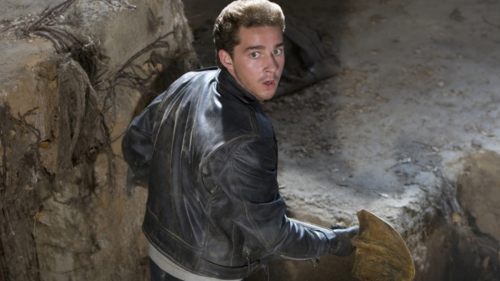What’s To Be Found 30 Years After THE LAST CRUSADE? Illumination
Indiana Jones and the Last Crusade is 30 years old today. I could start this tribute off with a mean joke about Kingdom of the Crystal Skull, but that would be getting off on the wrong foot. Crystal Skull exists, and it is what it is. Last Crusade may no longer be the series’ finale, but it remains, for my money, the good Dr. Jones’ finest movie. Steven Spielberg, George Lucas, Harrison Ford and their creative peers’ third outing with the world’s most violent archeologist wears a multitude of faces. It’s a moving chronicle of an estranged parent and child’s reconciliation. It’s a thoughtful exploration of humanity’s search for the greater meaning in themselves and the world around them. It’s a pointed reminder that Nazis and those who’d throw in with them are both morally bankrupt and deeply stupid. And simultaneously to all of those, it’s an impeccably staged, impressively executed and consistently thrilling piece of adventure cinema.
Last Crusade turns on the development of Indiana (Ford) and his father Henry (Sean Connery)’s relationship. They’re different men in many ways and very similar in others. Indiana pursues history in the field, in lost tombs and on-the-fly plans. Henry pursues history in his diary, in esoteric clues and meanings hidden in a turn of phrase. Both are fascinated by and driven to uncover and understand human history. Indiana is fairly open with his feelings, if a bit hasty to express them. Henry is guarded with his, and so hesitant to appear vulnerable that it takes a crisis for him to open up. Both love each other deeply, but it takes a long time and extraordinary circumstances for them to begin understanding, let alone liking each other.
As a boy (played terrifically by the late River Phoenix), Indiana missed the spiritual meaning behind his father’s hunt for the Holy Grail, seeing only the search. As a young father, Henry missed that his son shared his love and passion but was expressing that love in his own way. The life the two lived together after in their younger years was, in Indy’s words “a lonely way to grow up, lonely for both of us.” The Jones' shared and separate loneliness grew into estrangement. Their shared quest for the Grail is the first common ground they have had in decades. Both want to stop the Nazis from seizing the Grail, and on a more personal level both are seeking what their mutual friend Marcus (the late Denholm Elliott) describes as “the divine in all of us.” In the course of doing so, Indy and Henry see the best of each other – Indy’s ingenuity and Henry’s meticulousness, their shared indomitable will and ability to think on the fly. The Joneses are, in their own mismatched way, deeply kindred spirits. Their realization of this is one of the major pieces of the, in Henry’s parlance, “illumination” they close the film having found.
The other major piece, if you’ll pardon the linguistic nod to Crystal Skull’s climax, is knowledge. Neither Indiana nor Henry get the immortality promised by the Holy Grail’s legend, nor do they walk away with the Grail itself. But it enables Indiana to save his father’s life and validates Henry’s life’s work. When the Joneses hold the Grail, a humble carpenter’s cup, they see not only the physical object itself but all that comes with it. Its history, noble and ignoble. The lives of all those who have sought it. The teachings of Christ, whose blood it caught. As an object, the Grail has its own quiet beauty. But for Indiana and Henry, the treasure of the Grail lies far more in what it means than in its physical self.
The Nazis see none of this. Indiana seeks the Grail to find and save his Dad and pushes forward even though he doubts. Indeed, his doubt is a crucial ingredient in the faith that enables him to claim the Grail. Henry seeks the Grail so that he might validate those who sought it before him, and that he might feel what they felt on their quests. All the Nazis want is power and glory. Hitler (Michael Sheard) and his Colonel Vogel (Michael Byrne) wants to infest the world with his hate-fueled empire. Donovan (Julian Glover) wants to live forever. Elsa (Alison Doody) wants the physical Grail as a trophy. They are, to the last, short-sighted and thoughtless – so much so that their plan to get the grail amounts to stealing Henry’s work to get to the Grail’s temple and then attempting to claim it with the blood-soaked equivalent of brute-forcing a password. The Grail’s history and deeper meaning are lost on the Nazis, even as the Joneses discover those meanings literally right in front of them. The Nazis are as clueless as they are dangerous, and in some cases, they are dangerous because they are clueless.
Indiana and Henry’s reconnecting, the enlightenment they achieve together and their triumph over the Nazis are so much fun to watch. A big part of the reason why lies in how well Spielberg and company tell Last Crusade’s story. The father-son relationship between Connery and Ford (assisted by Phoenix), and their spiritual quests are woven all throughout the film’s structure – particularly the opening and closing sequences. Last Crusade opens with a young Indiana racing to save an artifact from unscrupulous treasure hunters, braving a variety of perils only to be ignored by a disinterested Henry. Father and son are established to both share a passion and be wildly different people. The artifact is lost, but Indiana does share a moment of kinship with someone who respects and understands him. It closes with the adult Indiana racing to find the Grail so that he can save Henry from the Nazis. He braves a variety of perils and ultimately saves Henry with the Grail. This time they share a moment of love and recognition. The Grail is lost, but Indiana and Henry get to bid farewell to the knight who had guarded it (Robert Eddison), a kindred spirit.
Indiana Jones and the Last Crusade’s opening and ending echo each other, contrasting Indiana and Henry at the start and the end of their journey, revealing the extent to which their shared quest has changed them, as well as what those changes are and why they happened. It’s a splendid piece of storytelling, and the satisfaction it brings is both permanent and just one of many terrific things in an all-around terrific film. Here’s to its 30th birthday, and all those that are to come.


